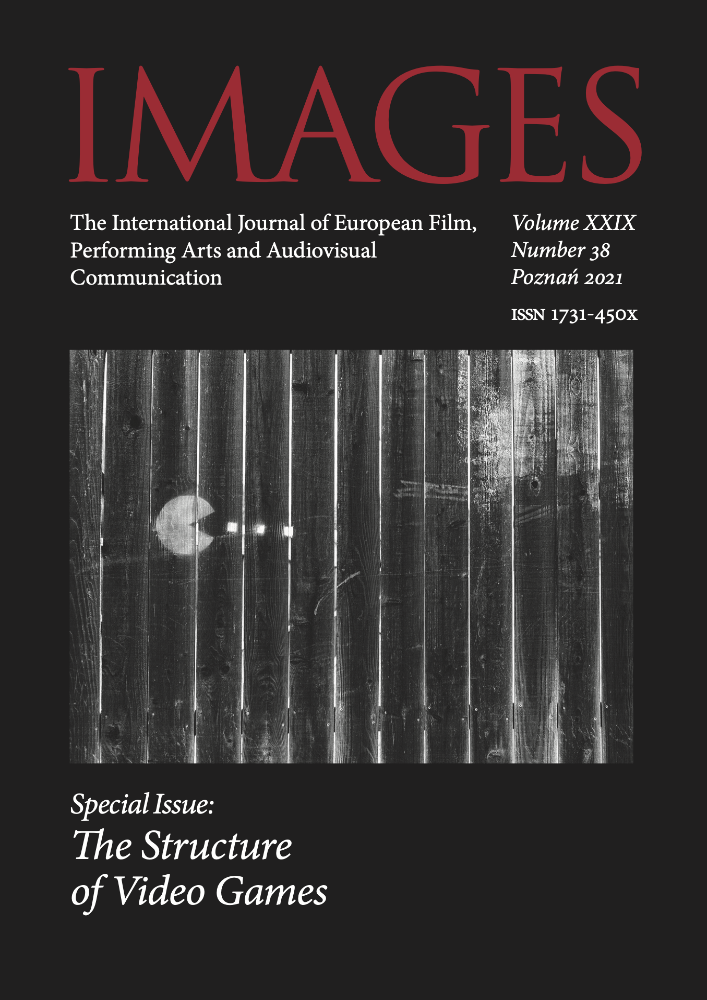Abstrakt
This article explores the potential of digital games to encode references encompassing specific cultural ideas of romantic love within their spatial structures, thus helping guide the player’s interpretation of romance as they interact with and move through those spaces. It undertakes an analysis of romantic subplots in BioWare’s fantasy role-playing games, specifically those which reappropriate the courtly love trope, and discusses elements of that remediation which rely heavily on spatial metaphors and structures, including the shared experience of heroic journey, the role of questing for the development of romance, and spatial positioning of lovers on the game map. Through its analysis, the article explores how digital games can employ spatial rhetoric while approaching topics of love, and how they are equipped to represent the materiality and spatiality of love and love narratives.
Bibliografia
Aarseth E., Quest games as post-narrative discourse, [in:] Narrative Across Media: The languages of storytelling, ed. M.-L. Ryan, Lincoln 2004, pp. 361–376
BioWare, Dragon Age: Origins, Electronic Arts 2009
BioWare, Dragon Age Inquisition, Electronic Arts 2014
BioWare, Baldur’s Gate II: Shadows of Amn, Black Isle Studios 2000
Boase R., The Origin and Meaning of Courtly Love: A critical study of European scholarship, Manchester 1977
Calleja G., In-Game. From immersion to incorporation, Cambridge – London 2011
Campbell J., The Hero with a Thousand Faces, New York 1949
Cormier R.J., “You Make Me Want to Be a Better Man”: Courtly values revived in modern film, [in:] The Legacy of Courtly Literature, eds. D. Nelson-Campbell, R. Cholakian, London 2017, pp. 77–88. DOI 10.1007/978-3-319-60729-0_5
Domsch S., Space and narrative in computer games, [in:] Ludotopia, eds. E. Aarseth, S. Günzel, New York 2019, pp. 103–123. DOI 10.14361/9783839447307-006
Enevold J., Game Love – A Categorization Model, Gaming Moms 2008, <http://gamingmoms.wordpress.com/publications/>
Enevold J., MacCallum-Stewart E. (eds.), Game Love: Essays on play and affection, Jefferson 2015
Fay E., Romantic Medievalism: History and the romantic literary ideal, London 2002
Fernández-Vara C., Game spaces speak volumes: indexical storytelling, [in:] Proceedings of 2011 DiGRA International Conference: Think Design Play, 2011.
<http://www.digra.org/wp-content/uploads/digital-library/Game-Spaces-Speak-Volumes.pdf>
Frankel V.E., From Girl to Goddess: The heroine’s journey through myth and legend, Jefferson 2010
Ganzon S.Ch., Investing time for your in-game boyfriends and BFFs: Time as commodity and the simulation of emotional labor in mystic messenger, “Games and Culture” 2019, vol. 14, is. 2, pp. 139–153
Goodman Wollock J., Courtly love, [in:] The Encyclopedia of Medieval Literature in Britain, eds. S. Echard, R. Rouse, New York 2017. DOI: 10.1002/9781118396957.wbemlb245
Gratzke M., Love is what people say it is: performativity and narrativity in critical love studies, “Journal of Popular Romance Studies” 2017, is. 6, pp. 1-20
Howard J., Quests: Design, theory, and history in games and narratives, Natick 2008
Jenkins H., Game design as narrative architecture, 2004, <http://web.mit.edu/~21fms/People/henry3/games&narrative.html>
Lakoff G., Johnson M., Metaphors We Live By, Chicago 1980
Mackinnon L., Love machines and the tinder bot bildungsroman, “e-flux journal” 2016, #7, June 21, <https://www.e-flux.com/journal/74/59802/love-machines-and-the-tinder-bot-bildungsroman/>
Malinowska A., Gratzke M. (eds.), The Materiality of Love: Essays on Affection and Cultural Practice, New York 2017
McDonald H. (ed.), Digital Love: Romance and sexuality in video games, Boca Raton – London – New York 2017
Morrison C.-A., Johnston L., Longhurst R., Critical geographies of love as spatial, relational and political, “Progress in Human Geography” 2012, vol. 37, no. 4, pp. 505–521. DOI 10.1177/0309132512462513
Möring S., Simulated metaphors of love: How the marriage applies metaphors to simulate a love relationship, [in:] Game Love: Essays on Play and Affection, eds. J. Enevold, E. MacCallum-Stewart, Jefferson 2015, pp. 252–277
Murray J., Hamlet on the Holodeck: The future of narrative in cyberspace, New York 1997
Schrape N., The rhetoric of game space: Lotman’s spatial semantics as a method for analysing videogames, [in:] Ludotopia, eds. E. Aarseth, S. Günzel, New York 2019, pp. 245–269, DOI: 10.14361/9783839447307-014
Tolmie J., Medievalism and the fantasy heroine, “Journal of Gender Studies” 2006, vol. 15, no. 2, pp. 145–158. DOI: 10.1080/09589230600720042
Tuchman B., A Distant Mirror: The calamitous 14th century, New York 1978
Licencja
Prawa autorskie (c) 2021 Bednorz Magdalena

Utwór dostępny jest na licencji Creative Commons Uznanie autorstwa 4.0 Międzynarodowe.
